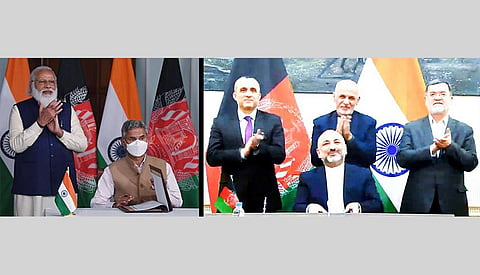
🔧 We’re Under Maintenance
We’ll be back shortly. Thank you for your patience.
We’ll be back shortly. Thank you for your patience.

India has increased its soft power diplomacy in Afghanistan as the war-torn nation looks at an altered future.
On February 9, India signed a memorandum of understanding with Afghanistan for construction of the Lalandar (Shatoot) Dam in the war-torn nation on a tributary of the Kabul river that would provide safe drinking water to over 2.2 million people in the capital city and boost cross country irrigation facilities.
The agreement for the $ 236 million project that is part of the new development partnership between the two countries was signed by India’s external affairs minister Dr S Jaishankar and his Afghan counterpart Hanif Atmar in the presence of India’s Prime Minister Narendra Modi and Afghanistan’s President Dr Mohammad Ashraf Ghani. It would also facilitate irrigation and water supply for Charikar city.
This will be the second major dam built by India in the region after the India-Afghanistan Friendship Dam (Salma Dam) that was inaugurated in June 2016. It would be one of the nearly 150 developmental projects currently underway in Afghanistan that have been undertaken by India.
Infrastructure development has been one of the cornerstones of India’s foreign policy for Afghanistan as it seeks to limit the influence of Pakistan and prevent the country from becoming a safe haven for terrorists against India. Till this date, India has completed more than 400 projects across all 34 provinces in Afghanistan. It is symbolic of the strategic importance India imparts to Afghanistan.
“India has been one of the main partners for growth for Afghanistan in the last two decades. Our projects are spread in the area of infrastructure, capacity building, agriculture, education, health and many other sectors,” said Prime Minister Modi. “A decade ago, the construction of the transmission line at Pul-e-Khumri improved the power supply in Kabul. That is why I say that the agreement for Shahtoot dam that we have signed today is not just built on bricks and mortar but on the strength of Indo-Afghan friendship.”
Through the many projects that India has helped fund and construct in the past, it has created a favorable impression for itself with the average Afghan on the road. These include construction of Afghanistan’s Parliament building in Kabul, restoration of Stor palace, financing Afghan National Agriculture Sciences and Technology University in Kandahar, constructing the Chimtata power substation, a cricket stadium and a cold storage warehouse in Kabul and upgrading telephone exchanges and expanding national television network.
In recent times, the involvement has only increased. The many projects that are currently underway include a road connectivity to Band-e-Amir in Bamyan Province that would promote tourism, low-cost housing for returning Afghan refugees in Nangarhar Province to promote their resettlement, a gypsum board manufacturing plant in Kabul to promote value added local industry and for import substitution, and a polyclinic in Mazar-e-Sharif. During the pandemic, India reached out to Afghanistan, like it has to all other neighbors, with supplies of medicine and PPE kits last year and recently with vaccines this year.
The soft power approach has enabled India to navigate its relations with a country that is considered difficult to manage diplomatically. The omnipresence of Taliban in the country which was only reiterated by the peace deal with the US in February 2020, only makes it tougher for India.
Infrastructure development has been one of the cornerstones of India’s foreign policy for Afghanistan as it seeks to limit the influence of Pakistan and prevent the country from becoming a safe haven for terrorists against India.
India’s broad foreign policy for the region hinges on ensuring sustained democracy in the country and limiting the influence of Taliban while reducing that of Pakistan. The main interest is to ensure the country does not become a safe haven for terrorists. But this strategy based purely on grants, infrastructure projects and humanitarian aid, has its limitations.
There may be a need for India to expand its presence in the country further. Most of it so far, has been restricted in and around the capital city where the US forces have been primarily concentrated. With the withdrawal of the US now a near certainty, India’s hold may weaken and it would need to open itself up to negotiations with Taliban on its own. That would be a tricky double-edged sword but the many dams and bridges that India has built in the country should come in handy.